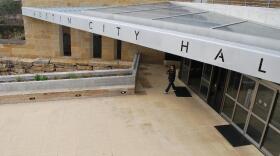Over the years I've been defined as many things: a woman, a mother, a grandmother. I've been an activist, a professional and a retiree. Now, I'm a public servant in Austin on the city council. My district has more African Americans than any other in the city.
Over the years, as you may imagine, some of my roles have changed. But least one remains: I'm a mother – no matter how old my son and daughter may be.
I imagine most parents are like me. That's why my heart breaks when I try to step into the shoes of the parents, family and friends whose loved ones have been killed.
I can't begin to imagine their pain, anger and sense of disbelief. I'm sure they experience numbness at times, and eternal heartbreak. When a mother's child is killed, no matter their age, I feel saddened. My reaction is always the same: I call my children. It soothes me to hear their voices. I tell them I love them. I ask if they're okay and remind them to be 'careful out there.'
In the back of my mind I worry about both of my children. But I'm particularly worried about my son. He is a young black man who is also in law enforcement.
As I'm sure you'll understand, the last few weeks have been extremely difficult for me. It started with Alton Sterling's execution in Baton Rouge. Then Philando Castile's in Minnesota. Then the execution of five peace officers in Dallas. That followed by that of 84 people who were ran over and killed in France. Then three officers were executed in Baton Rouge. Each death played over and over on the 24-hour news cycle.
I'm appalled at the total disregard for human life.
As an elected official and as a woman of faith, I've attended forums and prayer services seeking answers – hoping that this time we put aside the hate speech and seek the humanity in those who are 'different' from us.
It hasn't happened yet – and still I'm hopeful, perhaps because I recognize life has always been full of contrasts. As a child of segregation, I grew up during a difficult time. But I also had an advantage we don't have today – I grew up knowing all the Black police officers. You know why? Because we lived in the same community.
Another contrast in my life is that I live out my faith in the Episcopal Church, a denomination that is majority white and yet acknowledges the 'sin of racism' has infected the body of the faithful. But the most challenging contrast I'm dealing with is that, as an elected official, I'm charged with crafting policies that are to be administered without bias. And yet I see bias around me everyday.
I recently opened my door to find a young intoxicated white man sleeping on my front porch. The night before, I saw him climbing over someone's fence and then trying to climb over my gate, but instead fell asleep. When police came to my home, they woke up the young man, called a cab and sent him home.
I'm glad he is OK – but a chill overcomes me when I wonder what would've happened had my son climbed over two fences in the middle of the night – would he have been fortunate enough not to be shot by a property owner? Had he been found sleeping on someone's porch, would he have been placed in a cab or a patrol car? Would he have been sent home or taken to jail? Is it just me – or is there a bias?
I admit I suffer from a generational history of trauma. It's common among African Americans. Our psyches and souls are scarred because we are still seen as 'the other'.
That's why I still give my son 'the talk' when he comes for a visit - even though he is a grown man in law enforcement. Few white parents ever have to give 'the talk' to their children.
So, that’s where we are. But where do we want to be?
I have some suggestions. I suggest we acknowledge that in Texas, and particularly in Austin, we are segregated: geographically and economically. I suggest we resist stereotyping and making assumptions about 'others'. I suggest we re-engage communities with limited education and limited income. And – above all - I invite minority role models and mentors to show up, shore up and be examples to our children of what is possible.
I suggest, as Mahatma Gandhi once said, that we become the change we wish to see in the world.
Change happens when conversations become commitments. Change happens when all the voices are heard, respected and valued.





